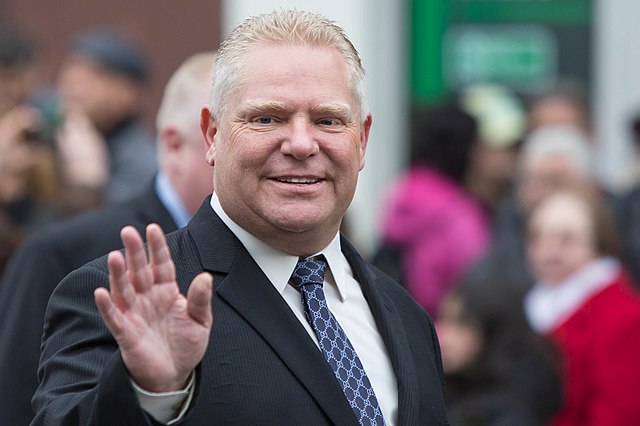Canada News
Ford government pauses Liberal laws including vaping laws and ticket resale price caps

FILE: Ford has made several changes since he was elected last month, including putting the public service under a hiring freeze and imposing a wage freeze on its managers, and taking steps to dismantle the province’s cap-and-trade system. (Photo By Bruce Reeve, CC BY-SA 2.0)
TORONTO — A number of laws passed by Ontario’s previous Liberal government have been put on hold by the newly elected Progressive Conservative regime, including measures to tighten rules around vaping and to cap resale values for sports and concert tickets.
A spokesman for the Progressive Conservatives said Wednesday the new government, which was sworn in Friday, wants more time to consult and examine the laws before they come into effect.
While some advocacy groups welcomed the move, critics questioned the government’s reasons for revisiting the laws.
NDP Leader Andrea Horwath accused Premier Doug Ford of making changes without any explanation or public notice.
“No one voted for business to be conducted in secret, behind closed doors,” Horwath said in a statement.
“And I’m sure no one voted to have a premier that would listen to influencers and lobbyists while shutting out everyday people affected by the laws. Ford seems to believe the public doesn’t deserve information about what he’s up to and why, and that’s wrong.”
Ford has made several changes since he was elected last month, including putting the public service under a hiring freeze and imposing a wage freeze on its managers, and taking steps to dismantle the province’s cap-and-trade system.
The province’s chief science officer also said Wednesday that she had been fired by the new government.
Molly Shoichet, a biomedical engineer, was hired seven months ago by former premier Kathleen Wynne to advise government officials and promote the province’s research domestically and abroad.
Ford’s spokesman, Simon Jefferies, said Wednesday that the government is underdoing the process of “finding a suitable and qualified replacement.”
Jefferies said earlier in the day that the government will delay the implementation of new rules around vaping, which would have regulated the activity in much the same way as smoking.
“The government will work with the public, experts, and businesses to re-examine the evidence related to vaping as a smoking cessation tool to ensure that any changes are in the best interests of everyone and protect Ontarians’ health and safety,” he said in a statement.
Halting the new regulations will not change the current provisions in the Smoke Free Ontario Act and the Electronic Cigarettes Act, he said.
Maria Papaioannoy-Duic, spokeswoman for the Vapor Advocates of Ontario, lauded Ford and new Health Minister Christine Elliott for the move.
Vaping advocates have argued that the activity is safer than smoking and moves people from the toxic chemicals found in tobacco to an alternative, which can help them break their habit.
Joe Mihevc, the chair of Toronto’s Board of Health and a city councillor who once served alongside Ford, said he questions the decision to pause the legislation.
Public health units across Ontario have studied the impacts of vaping and agreed with the restrictions the previous government’s laws placed on the product, he said.
Mihevc said he believes that once the government digs in and does its own research it’s likely to find claims that vaping is an effective tool to help smoking cessation aren’t true.
“We considered it a closed action” once the bill was passed by the Liberals, he said. “I also wonder what public health evidence, not lobbyist energy, is being used to resurrect this as a live issue?”
The government also confirmed Wednesday it has delayed a law which would have capped sports and concert ticket resale prices at 50 per cent above original face value will not immediately move ahead.
“The previous government attempted to institute a cap on ticket resales with no way to enforce that cap, resulting in less consumer protection,” Jefferies said. “We have paused the implementation of this section until we can review this provision in full to make sure it is in the best interest of Ontarians.”
The legislation also bans so-called “scalper bots” that buy a large number of tickets online for an event and then resell them at a large profit. The ban on the bots has not been halted by the government.
The provisions in the new Ticket Sales Act are contained in omnibus consumer protection legislation that also includes strengthening rules around home warranties, real estate practices and travel services in Ontario.
The Liberal government passed the bill in December 2017 and it was set to come into effect on July 1.
The Tory government has also halted changes to legislation that strengthen oversight of law enforcement and redefine police officers’ duties. The government will now further consult with stakeholders, including police associations who felt the law was rushed.
Bill 175, dubbed the Safer Ontario Act, passed in the legislature in March and offers the first updates to the Police Services Act in more than 25 years.
One of the most significant changes involves expanding the mandates of the province’s three police oversight agencies, increasing the scope of what they can investigate and adding extra accountability measures.
The Tory government will also delay changes to immunization reporting rules, which Ontario’s doctors had argued would burden them with excessive paperwork.
The legislature is expected to be recalled for a brief summer session next week, and Ford is expected to give a throne speech laying out his government’s priorities.
Two longtime Tory legislators — Randy Hillier and Rick Nicholls — said Wednesday that they will run to be Speaker of the House. Tory legislator Bill Walker said he was contemplating a run for the job.
The speaker acts as an impartial arbiter over debate and is selected at the start of every new term by a secret ballot of legislators.





















